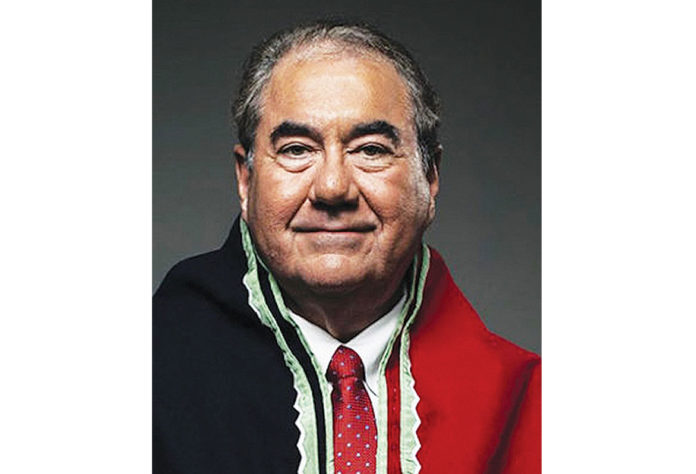Geoffrey Standing Bear, Principal Chief
Osage Nation
Osage Casino Hotel – Tulsa, OK and Osage Casinos in Bartlesville, Hominy, Pawhuska, Ponca City, Sand Spring and Skiatook
osagecasinos.com / osagenation-nsn.gov
BENEFITS OF GAMING: Indian gaming, and the benefits of it, are relatively new to the Osage compared to many of the other tribes. When I took office as a member of our legislature, the Osage Congress, my goals were centered around this economic growth. As a legislature, we said, ‘What is important?’ We came to the quick conclusion that the answer was the preservation of our language, culture, and land acquisition. We had lost 90% of our surface lands during those 100 years of that system of government, and we also had lost about a third of our headrights out of the tribe. The list goes on and on.
We started getting into actual gaming operations with very small casinos. When I became Chief ten years ago, I was able to catch that momentum that was already established by decades of Osages seeking economic self-sufficiency and self-determination and apply it quickly. We got busy taking gaming revenues and rebuilt our traditional arbors. I went and looked at other tribes’ language classes and immersion programs around the country and we started building our programs. There were no significant federal monies for that; this was all paid for by gaming.
The time came when we were going to do a new casino in Tulsa, which is the closest to the urban area we have. My predecessors had a smaller casino there, but we wanted to build a larger one – the size that market studies said we should be doing. We were debating this amongst ourselves, and then one week, received a call that said, ‘Ted Turner’s going to sell his 43,000-acre ranch.’ It used to be ours, of course, this whole area. The first thing I did was call the banker that we had been doing business with. We quickly put together a consortium of financial institutions led by the Bank of Oklahoma. We tapped into those resources by pledging, as you must in gaming, parts of the revenue of our gaming. That banking relationship, which I’d learned how to navigate working with other tribes, opened the doors, and we were able to purchase the 43,000-acre ranch. We were able to build the new casino in Tulsa and the other casinos, and we unleashed all that power that had been kept here. I would not allow a mortgage to be involved, and we paid off everything within five years, almost to the week.
Other tribes throughout the country have been so open with us. I was able to go down to one tribe and learn about their community development financial institution. We now have one, which loans money to our people who had bad credit and builds up their credit. We are getting consumer loans going and bought the old First National Bank building with gaming money. We are using a grant and our own money to build out internet broadband for the first time this year. There’s still half of our people that don’t live here and we are trying to attract them back, especially our younger tribal members.
GOALS & INITIATIVES: The gaming enterprises are the income generators. We’ve been trying to diversify like other tribes and have found that difficult. We began using our gaming monies and became enamored with 8(a) programs. But one of the tribes in Oklahoma who was the most successful in this, visited with me. Many tribal nations tried to look at 8(a) as an end all, magic pill, but this tribal nation said, it’s not, it’s a tool. There’s an over reliance on 8(a), and we did make that same mistake. We got into the construction part of our operations, IT, working with the federal government and military bases. We did all these other federal entities and weren’t successful. And we ended up using our gaming money to subsidize these areas we did not intend to subsidize. We do purposely subsidize activities such as our greenhouses, bison, and cattle herds, but 8(a) enterprises just weren’t working properly, because we thought it was sort of a magic path, and it’s not. We learned that hard lesson like a lot of tribal nations.
What we want to do, and have done, is look for business segments. We ended up working near Tulsa with unmanned aerial systems, and we are working with Oklahoma State University and people in the business. We’re not trying to do our own companies and compete. We are leasing to companies that are doing drone testing and wind tunnels. We are looking at that larger segment of the business. Within that, what business opportunities are there now? That was a big turn and we’ve just made it.
We’ve acquired a few thousand more acres, and we have priorities on where we go to purchase. We want to get land close to the relatively small freshwater aquifers and contiguous to individual allotment lands that people own fractional interests. Even after the Cobell process, there was not enough money from the federal government, although we were appreciative of it, to finish those missions. So, we are acquiring the undivided interests of lands that have an Indian restricted status.
I’m so proud of our language people. In the movie, Killers of the Flower Moon, Robert De Niro learned a lot of lines in the language. Lily Gladstone and the other ladies worked with our teachers. We are down to a handful of speakers, but after 10 years, we are at the point where we have good teachers. And the children are moving from just saying prayers and songs, which is so beautiful, into conversational Osage. All of that is made possible by Indian gaming.
LEGISLATIVE: We are not what they call a McGirt tribe, which includes the Five Civilized Tribes in Oklahoma. We are filing friend of the court briefs in similar cases in our area to see if we can clarify our situation, because each tribal nation is unique. All the functions of a government – condemnation power, police powers, etc. – how does that translate today to non-McGirt and the McGirt cases of tribal nations? That is a pending issue right now. Government is expensive, so we try to keep government small here. If you try to grab responsibility, there’s a cost. The various tribes are trying to work those issues out daily. We have a hostile governor here in Oklahoma to tribal nation development, Governor Stitt. He’s not very good in our partnerships. Hopefully that’ll change – I’m not giving up on it.
These gaming dollars are rare historically. I’ve been in this business since 1980, and these funds, monies and the activities involved, could be gone very quickly. There are the debates about sportsbook, geofencing, and all the potential threats to the building of brick-and-mortar casinos compared to using mobile devices, and how that interface is going. And then the role of states, federal government, and the tribal nations. That area of conflict and resolution between the federal government, states, and tribal nations is really what make up Indian law.
Economics at the end of the day will govern the issue, but we know by the time you’re able to read those tea leaves, a lot of the court decisions are already heading to being written and the legislative process is already engaged. So, we have to all talk to each other, recognize our differences, and respect each of our ways. We need to remember what’s important – our culture, our language, and our land. And from there, good mental and physical health among our people. That’s what inspires me every day.














































